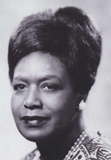Clinician, educator, and researcher who transformed social work and hospice and palliative care

Known as a shining example of the importance of the social work profession to our country and its citizens, Bernice Catherine Harper has represented the most vulnerable, the underserved and those in need of health care. As a leader of the hospice movement and the author of a groundbreaking book on care for the dying, Harper forever changed the fields of health care and social work.
Her determination and diligence emerged early. One of 12 children, Harper needed help to pay for college. She so impressed the president of Virginia State College with her spirit and intelligence that he provided housing to her in his own home. When segregation kept her from pursuing an MSW in her home state of Virginia, she became one of the first out-of-state students at the USC Suzanne Dworak-Peck School of Social Work and later served as president of its Alumni Association. In 1959, she also blazed the trail as one of the first women of color to earn a master’s in public health at Harvard University. In 1994, she was awarded an LLD by Faith Grant College in Birmingham, AL.
Harper served at City of Hope National Medical Center in California from 1961 until 1976, including as coordinator of the home care program, chief social worker, and Director of Social Services. There, she developed one of the nation’s first oncology social work programs, and in 1970, she was elected president of the American Society of Hospital Social Work Directors. Her clinical experience led her to devise the Harper Schematic Comfort-ability Scale. She also wrote a landmark book, Death: The Coping Mechanism of the Health Professional, which made an immediate impact on the profession, earned a Better Life Award from the American Health Care Association.
Among her major accomplishments while serving over 30 years as a Medicare and Medicaid advisor for the U.S. Health and Human Services Department was the incorporation of hospice benefits into Medicare, a service now widely used across the country. Her many leadership roles included chairing the National Hospice Organization’s task force on access for minority groups.
Also a member of the International Council of Social Welfare, she helped launch a hospice foundation for sub-Saharan Africa, especially for AIDS patients. Now known as Global Partners in Care, it has nearly 100 hospices in 15 countries and maintains links with many U.S. hospices. Together, NASW and the National Hospice and Palliative Care Organization support the education of care workers in Africa and grant a scholarship in Harper’s name.
Harper’s numerous honors include her selection as a Member of the Institute of Medicine, National Academy of Sciences, an honor accorded to very few social workers; being the first recipient of NASW Foundation’s Knee/Wittman Outstanding Achievement in Health/Mental Health Policy Award; receiving the U.S. Health and Human Services Department’s Distinguished Service Award; and being elected an NASW Pioneer. Colleagues say her “authenticity, kindness, and integrity make everyone feel important,” while her humility leaves many unaware of her great achievements. She truly merits her description as a “brightest star” of inspiration.